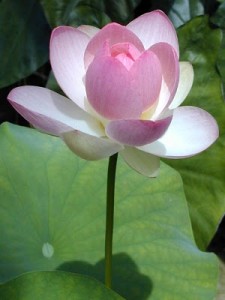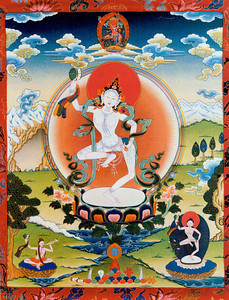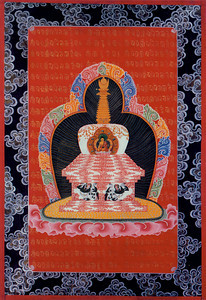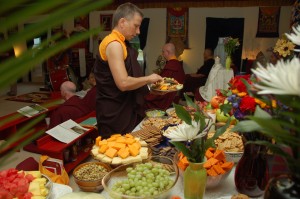An excerpt from a teaching called Bodhicitta by Jetsunma Ahkon Lhamo
From this very moment forward, I offer this life as a gift to the Three Precious Jewels. My pure intention is to accomplish the purpose of self and others, supreme enlightenment, quickly and surely. Thus I vow that all my life, every portion shall be used to accomplish that goal. All my activities shall accomplish that goal. All my thoughts and feelings are directed towards that goal. All my possessions shall be strengthened to support that goal. I shall seek all appropriate teachings, empowerments, and spiritual activities in order to secure that goal. My own enlightenment is now considered to be equal to and non-dual with the enlightenment of others. Therefore I vow to support fully and without hesitation the practicing spiritual community. I vow to support fully with unconditional love the Three Precious Jewels, the recitations, the Sangha and the temple. I will not kill; I will not lie to accomplish selfish purpose. I will not steal. I will not become intoxicated and therefore forget my purpose and vows. I will not engage in adultery, promiscuous activity by which my intention will be compromised.
I fully intend to do all that I can to accomplish the liberation of all sentient beings. I consider the realization of all beings to be equal with my own and of equal value. I fully support the spiritual community and its purpose on Earth. Should any activity, or possession or relationship be contrary to those purposes, I will systematically change them or eliminate them from my life. This I promise so there will be an end to hatred, greed and ignorance in my mind stream and in the 3,000 myriads of universes so that all beings and I myself shall achieve the precious awakening.
The Refuge Vow
I take refuge in the Lama,
I take refuge in the Buddha,
I take refuge in the Dharma,
I take refuge in the Sangha.
The Bodhisattva Vow
I dedicate myself to the liberation and salvation of all sentient beings. I offer my body, speech and mind in order to accomplish the purpose of all sentient beings. I will return in whatever form necessary under extraordinary conditions to end suffering. Let me be born in times unpredictable, in places unknown until all sentient beings are liberated from the cycle of death and rebirth. Taking no thought for my comfort or safety, Precious Lama, make of me a pure and perfect instrument by which the end of suffering and death in all forms may be realized. Let me achieve perfect enlightenment for the sake of all beings. Then by my hand and heart alone, may all beings achieve full enlightenment and perfect liberation.
Copyright © Jetsunma Ahkon Lhamo. All rights reserved








